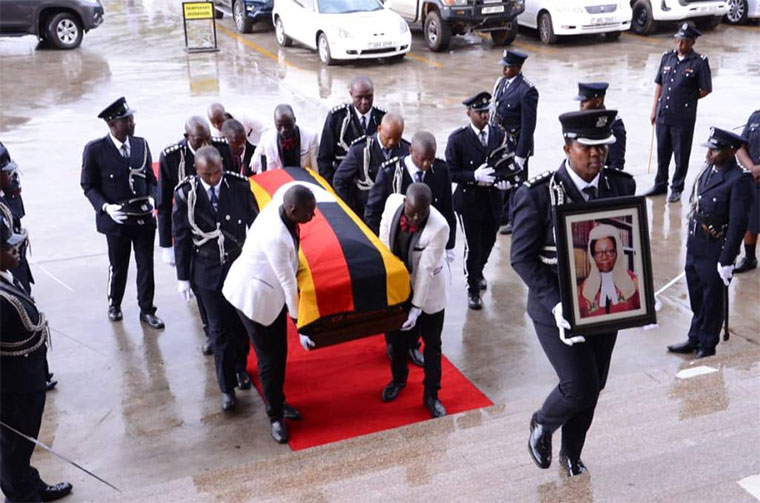The burial of justice Stella Arach Amoko has been postponed. According to the chief registrar Sarah Langa Siu, the burial will not go on as planned tomorrow June 23.
"This is to inform you that due to factors beyond our control, the burial of the late honourable Justice Stella Arach Amoko Justice of the Supreme court, will not take place on Friday, June 23rd, 2023 as had been planned,” reads the letter addressed to all justices of the Supreme court, Court of Appeal, judges of the High court, deputy registrars, assistant registrars, chief magistrates, magistrates grade one and two and all the staff of the Judiciary.
The letter released today is copied to the chief justice, his deputy, the principal judge, permanent secretary to the judiciary, and the secretary office of the president. The postponement comes at the time when the family of Arach petitioned the judiciary regarding the decision to bury her remains in Adjumani district.
Amoko, who served in the judiciary for 26 years, passed away at Nakasero hospital over the weekend aged 69. The controversy surrounding the resting place arose after the family of her husband ambassador Idule Amoko submitted a letter to the judiciary requesting that she be buried in Adjumani district. As a result, two parallel burial programs were issued, with one indicating Nebbi as the burial site and the other in Adjumani.
In their June 19 petition addressed to the judiciary permanent secretary, Dr Pius Bigirimana, the family members, including the biological sister, brother, and daughters of the deceased, expressed their desire for Amoko to be buried in Nebbi, specifically at Jukiya Hill Ward, Juba cell, where her father was laid to rest.
“This is the humble petition of the biological family of the deceased Hon. Lady Justice Stella Arach Amoko against the alleged decision to bury our deceased sister and mother in Adjumani, praying for your good office to overturn the alleged decision and to have our said mother and sister buried at her home in Nebbi where her father was buried as she wished,” reads part of the petition.
The family argues that the deceased had verbally expressed her wish to be buried in Nebbi near her father's grave prior to her passing. They state that while still at Nakasero hospital, she invited her brother, from Nebbi and shared her desire to be buried there.
“…to this effect, the deceased while still at Nakasero hospital, invited her biological brother Picho Godfrey to come from Nebbi and expressed her wish to be buried in Nebbi,” the family contends in the petition.
Additionally, the family asserts that the children have no connection to Adjumani, their paternal ancestral home, and have never been introduced to the place or shown any land or property there.
The lawyers from GEM and Company Advocates led by Stanley Okecho had also written to the chief registrar warning her to cease and desist from continuing with the burial site of Adjumani or else face legal action. GEM in its letter indicated that it had instructions from Annette Yossa, Emmanuel Komakech, and Jackie Amony the biological children of the deceased Arach.
"In the family meeting held on May 18th, 2023, it was unanimously agreed that the final resting place for Lady Justice Arach would be Jukia Hill Wars, Juba village Nebbi district in fulfillment of her lifelong wish known by all close family members and other person's we do not want to disclose in this letter," reads the letter.
It adds "However to our clients’ dismay and utter shock Ambassador James Idule's relatives went to a meeting at the President's office and communicated contrary positions regarding the final burial place of our client's mother."
Kaal Ker Kwaro Jonam Kapita, the cultural institution of the Jonam, released a June 19, 2023, statement to the judiciary stating that Justice Arach should be laid to rest at the royal burial grounds at Kaal Ragem in Pakwach district. They urged the judiciary to respect Amoko's wish to be buried next to her father in Nebbi.
Unconfirmed reports suggest that the decision to bury Arach was made during a meeting at the president's office, from which the children and relatives claim they were excluded. Currently, Arachi’s body is in the funeral home at A Plus.
Sources who preferred anonymity told URN that the group from Nebbi and Adjumani met with the speaker of parliament Anita Among over the matter, but the meeting didn't yield any results. By URN, The Observer






